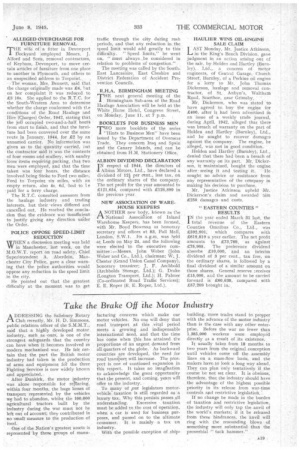Take the Brake Off the Motor Industry A DDRESSING the
Page 21

If you've noticed an error in this article please click here to report it so we can fix it.
Salisbury Rotary /A Club recently, Mr. H. D. Simmons, public relations officer of the S.M.M,T., said that a highly developed motor industry, such as 'ours, is one of the strongest safeguards that the country can have when it becomes involved in modern mechanized war. He felt certain that the part the British motor industry had taken in the production of arms and equipment for the three Fighting. Services is now widely known and appreciated, AfterDunkirk, the motor industry was. alone responsible for rernacing, within four tnonths, the huge losses of transport represented by the vehicles we-had to abandon, whilst the 100,000 agricultural tractors • built by the industry during the war must not be left out of account; they contributed in no small measure to the production of food.
Oneof the Nation's greatest assets•is represented by those groups of mann facturing concerns which make our motor vehicles. No one will deny that road transport at this ,vital period meets a. groWing and indispensable international need,. and that the time has come when this has attained tie proportions of an urgent demand from all quarters of the globe. As backward countries are developed, the need for road-transport will. increase. The prospect is one of continued expansion in this respect. It takes no imagination to acknowledge the. great opportunity that.the present, and coming, years will offer to the industry..
To many 'of pur legislators motorvehicle' taxation is still regarded as.' a luxury tax; Why this persists passes all understanding. Excessive taxation must be added to.the cost of operation, when a car is used for business purposes, and passed on to the ultimate consumer: It is mainly a -tax on industry. With the possible exception of .ship
building, more trades stand to proper with the advance of the motor industry than is the case with any other enterprise. Before the war no fewer than 1,385,000 workers were employed directly as a result of its existence.
It usually takes from 18 months to two years from the original conception until vehicles comp off the assembly lines on a mass-flow basis, and the makers have.to look a long way ahead, They can plan only tentatively if the coursP be not set clear, ft is obvious, therefore, that the industry should have the advantage of the highest possible priority in its release from war-time controls and restrictive legislation.'
If no change be made in the burden of taxation and restrictive legislation, the industry will only tap the, anvil of the world's markets; if it be released froth these hindrances, the anvil will ring with the resounding blows of something more substantial than the proverbial " tack hammer."




















































